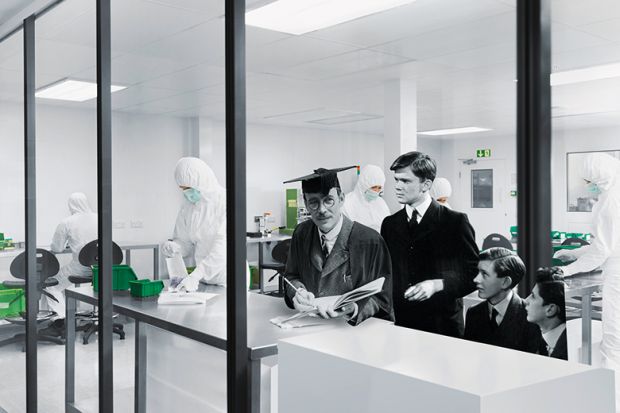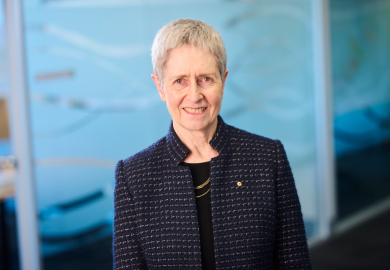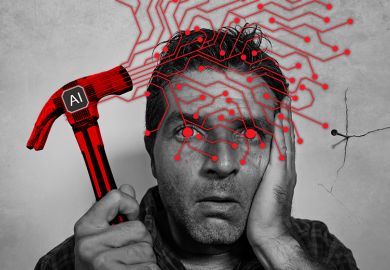The notion that the best university teaching is delivered by active researchers has for many years been regarded as something of a truism. The ideal of the teacher-researcher, popularised by Wilhelm von Humboldt, founder of the Humboldt University of Berlin in the early 19th century, is embraced particularly enthusiastically at research-intensive institutions, which tout the opportunity to be taught by those at the cutting edge of disciplinary advances as one of their unique selling points to students. But even less traditionally research-intensive institutions are influenced by the ideal, with some encouraging or even requiring their staff to have PhDs.
Having the time and resources to pursue research is perhaps the factor that most obviously separates university lecturers from other kinds of educators, such as schoolteachers. But the rise of teaching-only and casualised academic labour even in research intensives suggests that many universities feel able to offer high-quality courses without input from research stars. And higher education institutions focused on missions besides research – vocational skills, widening access, entrepreneurialism – might well conclude that a part-time professor with a second job in industry – and with a well-stocked contacts book to match – would better help their students to secure well-paid jobs on graduation.
“The supposed link between research and teaching is a bit of a sacred cow, but there is almost no research on it – it’s mostly assertion,” says David Palfreyman, director of the Oxford Centre for Higher Education Policy Studies.
“Good teaching certainly involves academics being up to speed on scholarship, such as updating knowledge via extensive reading, but it does not generally involve dashing from the research coal-seam to the lecture theatre with the latest insight.”
While many universities are keen to advertise the research credentials of their teaching staff, their strategies tell a different story, says Palfreyman, who is a board member of England’s Office for Students. “If the research-teaching link is so crucial, we need to explain why, in the UK’s 50 or so research-oriented universities, academics who are really good at research are usually relieved of teaching,” he says, venturing that institutions understand that a university’s “brand” is best served if their best researchers are left alone in the lab or the library.
Moreover, many UK universities have managed to flourish without doing much in the way of research, Palfreyman observes. Some 12 universities receive about half of the £1.6 billion awarded annually by Research England, with the bottom 12 sharing only 0.5 per cent of the pot, he says.
And although the methodology of the UK’s teaching excellence framework is widely questioned, the conspicuous absence of some Russell Group universities from the ranks of universities ranked gold for their supposed teaching quality has led many to question whether research and teaching skills are really as intimately linked as has been supposed.
To coincide with Times Higher Education’s Teaching Excellence Summit – which takes place at the University of Glasgow from 10 to 12 July – we canvassed academics’ views on research-led teaching. Of the 404 respondents, three-quarters of whom are UK-based, 50 per cent disagree with the contention that research-inactive staff make worse lecturers, compared with 21 per cent who agree. Arts and humanities academics are the most likely to agree (25 per cent) and least likely to disagree (44 per cent).
“Some of the best lecturers I have had were not research active but had exceptional pedagogical expertise,” says one social sciences postdoc (quoted respondents are UK-based unless otherwise stated).
“Teaching is an entirely different skill set from primary research,” adds a senior lecturer, adding that delving deeply into a research niche contrasts with the “assimilation of a broad range of outputs of others’ work”.
Moreover, a science lecturer points out that “most people are teaching outside the narrow focus of their research experience” since “research focus tends to be very narrow and teaching subjects (especially in earlier undergraduate years) tend to be broad. However, a research-active lecturer teaching within their area of expertise who also has great teaching skills will be able to offer insights that teaching-focused staff may not.”
Regarding the idea that only active researchers can capture students’ imaginations, a senior lecturer in science insists that a “good teacher can convey how exciting an area can be without ever having worked in it”. However, some respondents believe that without research engagement, lectures can become “mundane”, “derivative” and “boring”, as “out of touch”, “bored” and “coasting” staff go through the motions of teaching.
“To teach at university level and not be researching is a contradiction,” a science professor says. “Students expect their lecturers to be current and on top of developments, which gives credibility and instils confidence.”
“Motivating students and having the capability of responding to their curiosity on the subject is paramount,” agrees Benjamín Scharifker, rector of Universidad Metropolitana, a private university in Caracas, Venezuela, one of four university heads to complete the survey. “Lecturers who are not research active may face insurmountable difficulties in meeting these goals.”
Do researchers make good teachers?: survey respondents’ views
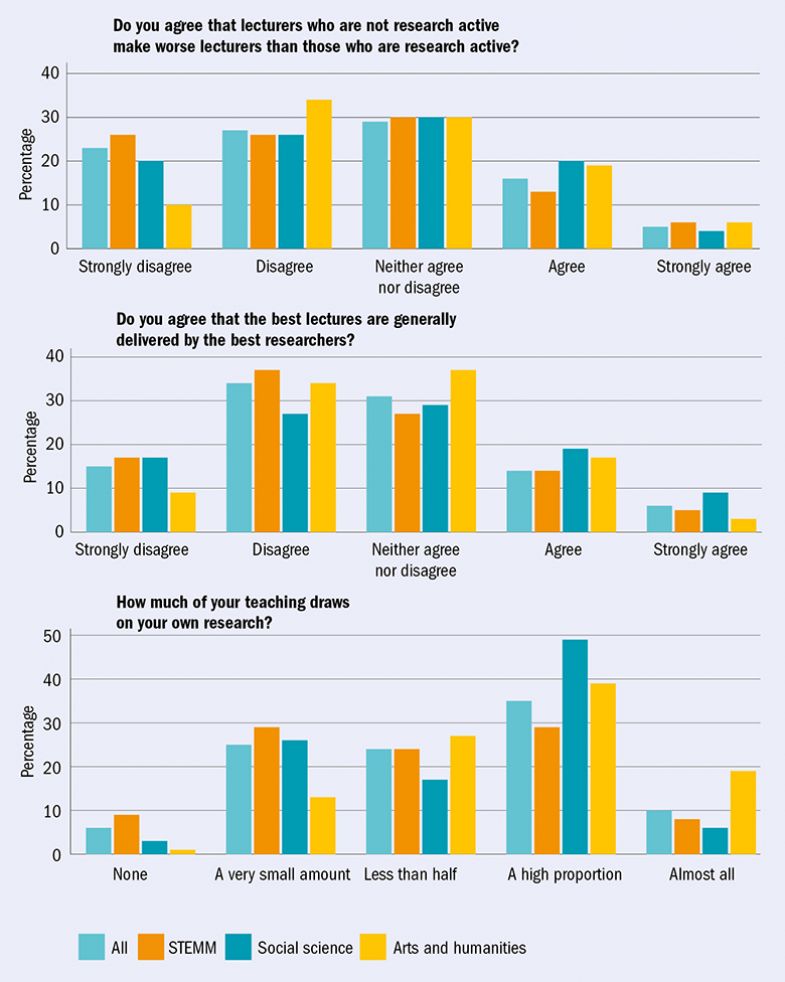
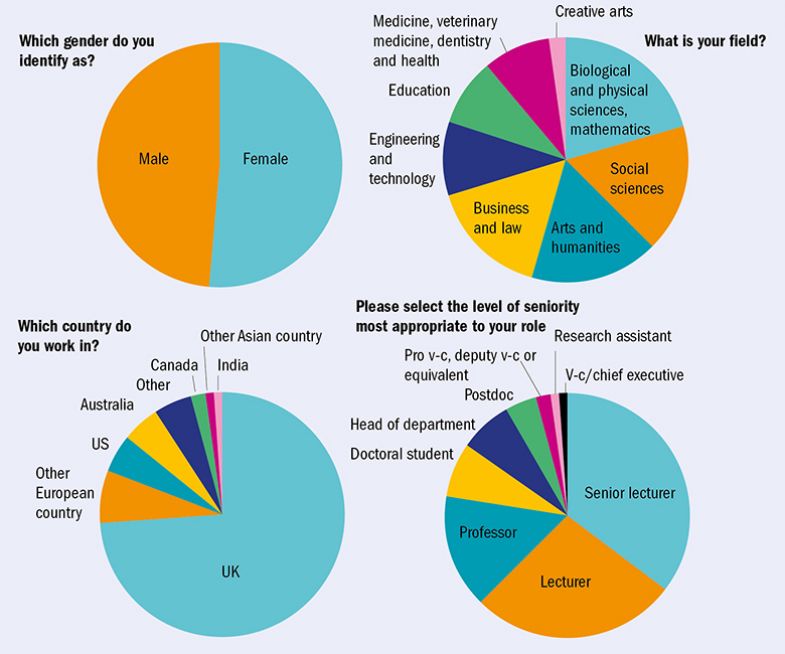
And Will Garrett-Petts, associate vice-president (research and graduate studies) at Thompson Rivers University, in British Columbia, Canada, argues that “those faculty consistently involved in research are going to be, in the long run, the most up to date, the most knowledgeable and the best able to mentor and advocate for their students…Those who, over time, become at arm’s length from the work of their discipline will find it difficult to embody and represent fully that discipline.”
On the other hand, many academics are sceptical about whether so-called star researchers also deliver superior teaching. Only 20 per cent believe that the best lectures are delivered by the best researchers, compared with 49 per cent who disagree. Social scientists are the most likely to agree (28 per cent do so) while academics in science, technology, engineering, mathematics and medicine are the most likely to disagree (54 per cent).
“I’ve not encountered a single good researcher in the last 18 years who can lecture well,” claims one engineering lecturer, while a social sciences lecturer in Australia contends that “great researchers are often terrible lecturers because they struggle to connect with students”.
“At our institution, the best published researcher gets the most complaints from students about their lectures, citing the academic as knowledgeable but boring,” adds a senior lecturer in business and law.
This sense is borne out by a recent study by Dutch academics, published in the journal Economics of Education Review in June. Examining the grades and course feedback from thousands of students from the University of Maastricht’s School of Business and Economics, the paper finds that being taught by top researchers does not improve students’ grades except at master’s level. Nor do students give top researchers higher ratings for their teaching. Indeed, bachelor’s students give below-average scores to the best researchers.
Some of our survey respondents argue that the very qualities that distinguish top researchers hold back their teaching. Such figures are so bound up in their research that they “assume that everyone is interested in the minutiae of their work, which is often tangential to the module being taught”, according to one US-based lecturer in business and law.
“Researchers often lack the core teaching skills, or perhaps can’t get concepts across in a student-friendly way,” explains Emma Thirkell, senior lecturer in human resource management at the University of Central Lancashire, who adds that the “ability to produce good research is entirely different to the skills needed to be a good lecturer”.
Others claim top researchers have neither the time nor the motivation to improve their teaching. “The best researchers are generally capable of being the best lecturers [but] many choose not to teach, or do so in a deliberately perfunctory manner to avoid too much teaching,” explains a science professor.
“Lectures are about looking outward to educate, inspire and inform – it’s not just about knowledge: you have to want to help others learn,” adds a head of a social sciences department. A head of department at a South African university says that accomplished researchers are “often are too self-absorbed to be student-centred and reflexive about pedagogy”.
But other survey respondents disagree that teaching and research skills are antithetical. “The best researchers have a higher tendency to make connections between the lecture and other, more advanced research topics, which can give new life to any boring lecture,” claims a Spanish PhD student. And, for one senior lecturer in social sciences, “the conceptual clarity, attention to detail, creativity and communication skills that underpin top research translates to exceptional teaching”.
“Teaching is not simply about taking things from a book: you need to be able to write that book,” says Massimiliano Vasile, director of the Aerospace Centre of Excellence at the University of Strathclyde’s Space Institute.
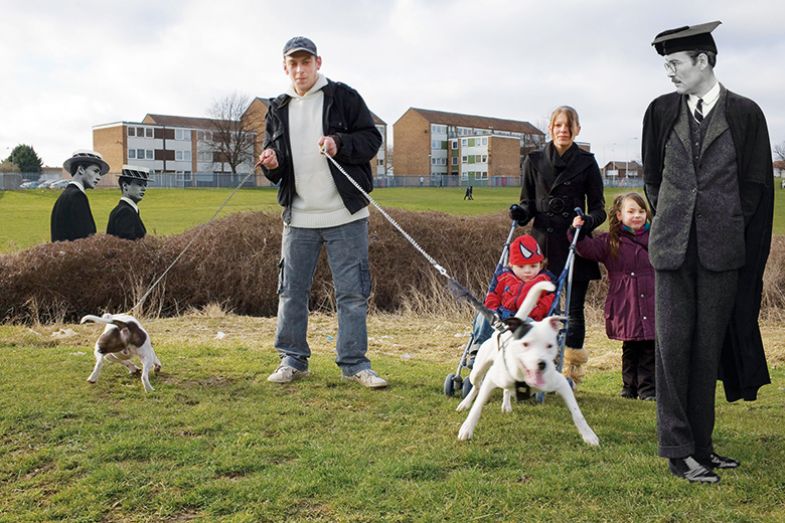
Some respondents admit that the breadth of undergraduate curricula gives them little opportunity to incorporate new research into their modules. Examples include the head of a UK engineering department, who notes that “large parts of [the department’s] programme is core material that does not change rapidly to reflect new research”, and the junior Russell Group scientist who is “assigned courses no one else wants” and therefore has “limited scope” to base his teaching on his own research interests.
However, such cases appear to be rare. Some 35 per cent of respondents state that a “high proportion” of their teaching draws on their own research, and 10 per cent claim “almost all” of it is. However, the figures are lower among STEM academics and higher among those in the social sciences and arts and humanities; 19 per cent of the latter say almost all of their teaching draws on their own research.
Many academics explain that they were recruited to teach in areas where they had research expertise, with one science lecturer using “plenty of examples from my own work” in his undergraduate teaching, even if “none of the critical information is based on my own research”.
A US-based science professor adds: “Even though very little of what I teach derives from my own research, my understanding of most of the fundamental concepts around most of what I teach has benefited a lot from my own research experience.”
And Zen Faulkes, professor of neurobiology at the University of Texas Rio Grande Valley, adds: “The professor who hasn’t updated his overhead transparencies in 20 years is a cliché, but there’s an element of truth to it. If I wasn’t publishing and going to conferences, I know I would not have as clear an idea of what knowledge and skills are on the horizon. Expecting professors to be research-active reinforces that we have an obligation to stay up to date in our knowledge.”
While the concept of research-informed teaching has been around for decades, recent years have seen the rise of the concept of “research-led teaching”. This buzzphrase recurs in many an institutional and departmental strategy document. But what exactly does it mean?
“It means you are using your own – and others’ – current research to shape the material delivered,” according to one lecturer in business and law. But others see it as involving a tighter connection between teaching and active research. Other definitions offered by our respondents include “teaching based on the active research of a lecturer”, “teaching activities developed around research topics”, or even “engaging students in current research”.
A science professor defines it as “teaching about how research is done, [with] learning happening through enquiry-based, research-like processes”. For a US-based science professor, it is a means by which “students can really solidify and internalise concepts and skills by doing actual research tasks”.
Mamdouh Shoukri, president emeritus of York University in Toronto, Canada, introduced this kind of teaching in a number of ways during his tenure at York from 2007 to 2017. “It could be part of tutorials where [students] discuss and analyse real research data that broaden their understanding of the subject. Or it could be part of fellowships or summer employment, where they work alongside PhD students,” he explains. The intention is not to make a significant contribution to knowledge; rather, “it should be viewed as learning experience”, akin to the entrepreneurship training that often leads to viable start-up companies or products.
However, many scholars are unconvinced about the merits of pushing students to undertake research. To many of our survey respondents, research-led teaching, defined in this way, is “nonsense”, “catch-all jargon” or a “fancy term” designed to allow research-intensives to “look down on institutions that are teaching-focused”.
“Not all students – very few, in fact – become researchers, [so] is your research relevant in a general formative degree?” asks Britta Zawada, deputy executive dean of the University of South Africa’s College of Human Sciences. This is “especially relevant in countries like South Africa, where an ageing cohort of mostly white, male researchers are doing their research to get international recognition that fits a global agenda, whereas the students’ demands are for local, contextual decolonised knowledge and skills”.
Others have more practical concerns. Research-led teaching is “nice to do but not necessarily sensible with class sizes of 300+”, says one professor in business and law.
However, many universities are making efforts to incorporate elements of research into teaching. At the University of Sydney, for instance, undergraduates participate in research at the highest level – including a $1 billion (£783 million) Microsoft-backed project to create a quantum computer. Final-year physics students at the University of Southampton are encouraged to spend a year working with academics on advanced research projects either at Southampton, Harvard University or Cern. At Imperial College London, more than 300 undergraduate students take part in a summer placement programme. And UCL’s Connected Curriculum , introduced in 2016, aims to allow all its students to learn through participating in research.
A similar scheme is also in place at fellow Russell Group institution the University of Leeds; all 35,000 of its undergraduates undertake a final-year research project as part of the “Leeds Curriculum”, says Paul Taylor, the university’s pro-dean for education. And as evidence of the stimulating and genuinely useful research that can come out of such projects, he points to the journal Reinvention: An International Journal of Undergraduate Research , which he helped to found in 2007 while at the University of Warwick. The latest edition, published in April, contains student takes on the “media representation of chavs”, the economics of university library fines and first-generation Nigerian British undergraduates’ take on Disney’s representation of the “dark continent” in the 1999 animated movie Tarzan.
“We need to move on from thinking of research as a mountain with a wise guru sat at the top,” agrees Stewart Hampton-Reeves, founder of the British Conference of Undergraduate Research (BCUR), which welcomed more than 600 student presenters to its annual conference at the University of Sheffield in April. “We need to think more creatively about what research is and how all members of an academic community can be involved in shaping new knowledge,” adds Hampton-Reeves, who is professor of Shakespeare studies and research-informed teaching at the University of Central Lancashire. In this regard, he adds, UK universities are playing catch-up with the US, where the concept is well established.
“Having a lively, strong culture of undergraduate research is vital to building our research capacity,” he says. “And it is a great educational experience for students, which gives them many academic and employability skills. It looks great on CVs as well.”
The learning experience: undergraduate involvement in research
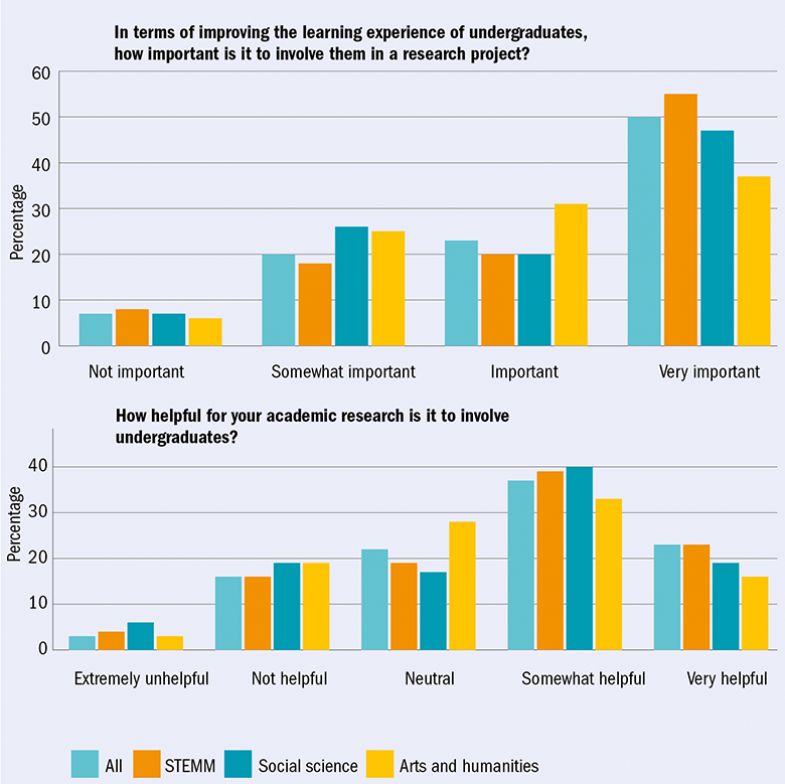
Virtually all our survey respondents feel that undergraduates would benefit from participating in a research project; just 7 per cent think this would not improve teaching, and 50 per cent see it as “very important”. That figure rises to 55 per cent among STEM academics.
“Research is very important because it allow the students to experiment and challenge concepts with other parameters and to promote curiosity,” says one lecturer in medicine. Research is “the way [undergraduates] develop and demonstrate real independence of thought. And some of the work they produce is fabulous,” adds one arts and humanities postdoc based in the UK.
However, many academics also have reservations about embracing research-led teaching. Some wonder whether participation in a specific project is appropriate for a broad-based undergraduate curriculum. Others question whether undergraduates are up to the task. “At this stage, they tend to not quite grasp what research is about,” says a Canada-based social sciences postdoc, while a maths professor believes that “meaningful participation” in research in his subject requires “a knowledge base beyond that of most undergraduates”.
However, others disagree. “I understand that people want to see education in a linear way but excellence can flourish at any level,” said Hampton-Reeves, who says that, in his experience, research produced by undergraduates “consistently confounds expectations”.
Texas Rio Grande Valley’s Faulkes agrees that it is “deeply important that students get the opportunities to deal with cases where nobody knows the answer”. However, he worries that undergraduate research could get caught up in credential inflation. He points to complaints on Twitter from US PhD students who have been denied research fellowships by funders because they didn’t have any publications going into their programmes. And he suspects that admissions committees for elite graduate schools employ similar criteria: “I worry that students will start getting pressured to start their research careers even earlier and get their names on papers in high school,” he says (he himself has published papers with high school students, “so the potential is there”).
Anna Mountford-Zimdars, director of the Centre for Social Mobility at the University of Exeter, also has concerns about the social justice element of research-led teaching, pointing out that intensive summer research placements can exclude lower-income students, who need to find paid employment instead. Late-blooming undergraduates with unrealised potential might also miss out, she adds.
Mountford-Zimdars recently published two papers with undergraduate researchers while at King’s College London: “Neither of these projects would have happened without these students,” she says. But are undergraduates generally a blessing or a burden to researchers? One social science professor argues that “every single course I teach (if not every single class) profoundly informs my current research and allows me and students to reflect on work from earlier in my career”.
“Students can raise pretty great questions because they tend to think outside the box rather frequently,” says Mariana Kalil, a professor at Brazil’s War College in Rio de Janeiro, adding that “about once every two weeks I hear something they have said about the literature and the work, in general, which is extremely important [to my research].”
But, when it comes to actively involving students in research, can their lack of experience threaten the integrity of a study? According to our poll, 60 per cent of scholars believe student involvement in research is either “very” or “somewhat helpful” to them as researchers, although only 49 per cent of arts and humanities academics feel that way. Meanwhile, only 19 per cent see it as unhelpful, rising to 25 per cent among social scientists.
“Undergraduates currently do an eight-week project in our labs and can also apply for studentships for summer projects. This has provided good data and students have been included in resulting papers,” says one UK-based science lecturer. Another asserts that it “can be helpful to have extra people to increase work capacity and also bring a different perspective”.
In some cases, the low-cost, no-pressure environment allows work on subjects that would not be suitable for postgraduates, argues Phoebe Cohen, associate professor of geosciences at Williams College, a liberal arts college in Massachusetts. “Undergraduates can work on high-risk projects that might fail because they are in it for the research experience, not a thesis [or] publications to move on in their career.” Jean-Baptiste Souppez, a senior lecturer in yacht design and composite engineering at Solent University in Southampton, agrees. He encouraged one of his undergraduates to pursue an interest in how Costa Rica’s boatbuilding industry might use more sustainable timbers: this led to a £500 bursary, a presentation at the BCUR conference and a forthcoming conference paper. If a postgraduate had suggested it, Souppez would probably have advised the pursuit of a project with “higher impact”, he says.
“As a PhD student, you [tend to take on] projects your supervisor is interested in and are expected to have research outputs on to which the supervisor can add their name,” says Souppez. “There is a lot more freedom for [undergraduates] to choose the topic they are really interested in, and thus get the most educational value from their research.”
Doubts remain, however. Many respondents express wariness about bringing students into the research fold. “They don’t have the lab skills required. By the time they have been trained, their project is nearly over,” says one engineering lecturer. A social science professor adds that even the best undergraduates “can’t keep up”, and lack “analytical capacity. They learn a lot but the projects get stymied.”
A scientist adds that undergraduates “don’t know enough to be helpful...When I’ve tried to involve even very good undergrads, I’ve ended up spending all my time filling in unexpected gaps in their knowledge.”
Ultimately, while involvement in research might make benefit both supervisor and student when the undergraduate is bright and motivated, there appear to be widespread doubts about the notion that involvement in research should be mandated for all students.
As one UK-based business professor puts it: “I want undergraduates who are keen and hungry for knowledge”. But he does not want to conduct research with students who have adopted the consumerist mindset of “I’ve paid and you’ll give me a degree”.

Sharing the pain of reviewer two: putting the connected curriculum into practice
“Have a lovely summer break.” Are there harder words to hear? There are, of course (“I like you, but I wish you were thinner” springs to mind from my own personal history). But when students wish us well for the “break”, it often grates. Why don’t they understand what we do? Why don’t they get that the summer is a long and taxing period of reading, researching, writing and conference attendance, punctuated with only the occasional glass of rosé?
Given these frustrations, I was curious to learn about the “Connected Curriculum” on joining UCL last summer. Part of UCL’s wider education strategy, the idea is that students learn through “participating in research and enquiry”. In short, it’s about connecting students with academics’ world beyond teaching.
As a new member of staff, I was asked to take over the popular environmental law module for final year students. The former module leader was an Oxford University Press Law Teacher of the Year, but although that person’s course materials were excellent, they just weren’t me. So I redesigned the course from the ground up, with each element of teaching built around the Connected Curriculum. A colleague suggested I was trying to cram far too much in, but I am an overeater with an addictive personality, so I carried on regardless.
The resulting 20 two-hour seminars were split into three sections. The first hour was a standard Q&A tutorial. The final 15-minute section was a bridge between the current seminar and the next. The other 45 minutes was when we did things based on the Connected Curriculum. One week, groups fed back on a “meet the researcher” exercise, in which they had interviewed four of the faculty’s other environmental law scholars about their research. The students then had to weave that research into their module coursework.
In another week, students spoke to a research task that asked them to make connections between environmental law and the “core” modules they had taken during their first and second years. I also invited “outsiders” into the classroom, including Lisa Vanhala from UCL’s political science department, and the City law firm Latham & Watkins (who were good sports about being questioned by the students on the ethics of what they do for their clients). And there was an extra-curricular book and film club, which connected the academic reading the students had been doing with examples from popular culture.
The main thing we did, though, was to research and write an academic article as a group. All 33 of us. I’d taken this idea from Dilly Fung’s open access book, A Connected Curriculum for Higher Education. I set the question – “Where and how is environmental law being taught in the UK?” – and that was pretty much it. The students decided how we would research it (scouring 100 law school websites and carrying out an online survey); undertook a literature review; and drafted the online survey. Everyone participated.
And then the pensions strike hit. By the time I came back, it was practically the end of term. I asked if anyone was willing to carry on after the module ended and 15 of the 32 said yes. I could have cried.
So here we are now, with a draft article almost ready to send off to a journal. I’ve warned the students that we might get rejected: that comments from Reviewer Number Two might make them want to curl into a ball and rock back and forth. But that’s also part of academic life, and so it’s no bad thing for them to experience it – right?
Steven Vaughan is a senior lecturer in environmental law at UCL.
POSTSCRIPT:
Print headline: Mr Chips with everything?
Register to continue
Why register?
- Registration is free and only takes a moment
- Once registered, you can read 3 articles a month
- Sign up for our newsletter
Subscribe
Or subscribe for unlimited access to:
- Unlimited access to news, views, insights & reviews
- Digital editions
- Digital access to THE’s university and college rankings analysis
Already registered or a current subscriber?
